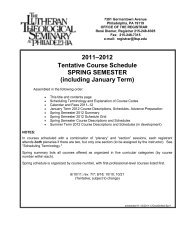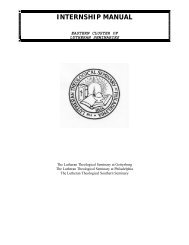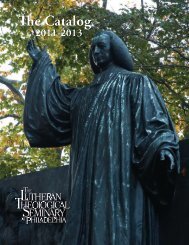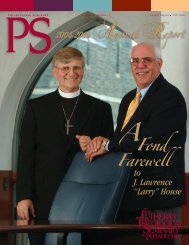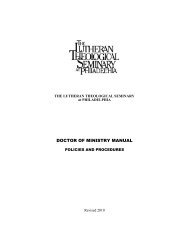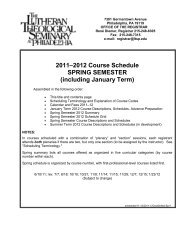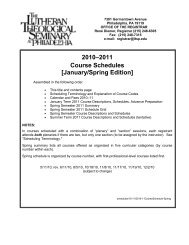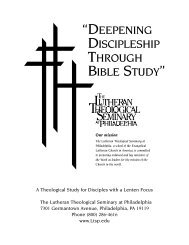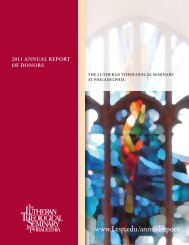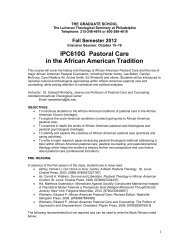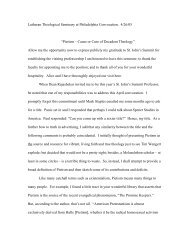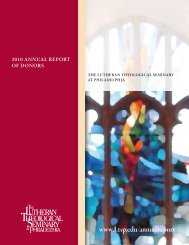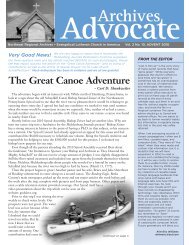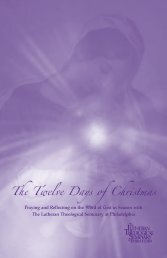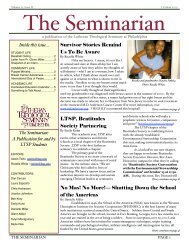Ethiopian Eunuch - Lutheran Theological Seminary at Philadelphia
Ethiopian Eunuch - Lutheran Theological Seminary at Philadelphia
Ethiopian Eunuch - Lutheran Theological Seminary at Philadelphia
Create successful ePaper yourself
Turn your PDF publications into a flip-book with our unique Google optimized e-Paper software.
Isaiah 53:1 Who has believed wh<strong>at</strong> we have heard?<br />
And on whom has the arm<br />
of the SOVEREIGN GOD been revealed?<br />
2 He grew up before God like a young plant,<br />
and like a root out of dry ground;<br />
he had no form or splendor th<strong>at</strong> we should see him,<br />
and there was nothing in his appearance<br />
th<strong>at</strong> we should desire him.<br />
3 He was despised and rejected by humankind;<br />
a man of suffering and one familiar with disease;<br />
and as one who hid his face from us,<br />
he was despised, and we held him of no account.<br />
4 Surely he carried our sickness,<br />
and our sufferings he bore.<br />
And we, we accounted him plagued,<br />
stricken and afflicted by God.<br />
5 But he was wounded for our sins,<br />
crushed for our iniquities;<br />
he was disciplined for our wellbeing,<br />
and by his bruises we were healed.<br />
6 All we like sheep have gone astray;<br />
we have all turned to our own way,<br />
and the RIGHTEOUS GOD has visited on him<br />
the iniquity of us all.<br />
7 He was oppressed, and he was afflicted,<br />
yet he did not open his mouth;<br />
like a sheep th<strong>at</strong> is led to the slaughter,<br />
and like a female lamb, silent before her shearers,<br />
so he did not open his mouth.<br />
8 By an eviscer<strong>at</strong>ion of justice he was taken away.<br />
And his gener<strong>at</strong>ion, who could have imagined – ?<br />
For he was cut off from the land of the living,<br />
plagued for the transgression of my people.<br />
9 He made his grave with the wicked<br />
and his tomb with the rich,<br />
although he had done no violence,<br />
and there was no deceit in his mouth.<br />
10 The JUST GOD delighted in crushing him with pain.<br />
If you make his life an offering for sin,<br />
he shall see his offspring, and shall lengthen his days;<br />
the delight of the ALMIGHTY GOD shall prosper through him.<br />
11 Out of his troubled soul he shall see;<br />
he shall find s<strong>at</strong>isfaction through his knowledge.<br />
My righteous servant, shall make the many righteous,<br />
and he shall bear their iniquities.<br />
12 Therefore I will allot him a portion with the many,<br />
and with the mighty he shall divide the spoil;<br />
because he poured out his soul to de<strong>at</strong>h,<br />
and was numbered with the transgressors;<br />
yet he carried the sin of many,<br />
and made intercession for the transgressors.<br />
Psalm 22:6 I am a worm, and not human;<br />
scorned by others, and despised by the people.<br />
7 All who see me mock <strong>at</strong> me;<br />
they make mouths <strong>at</strong> me, they shake their heads;<br />
8 “Commit your cause to the TRUSTWORTHY GOD;<br />
let God deliver—<br />
let God rescue the one in whom he delights!”<br />
9 Yet it was you who took me from the womb;<br />
you kept me safe on my mother’s breast.<br />
10 On you I was cast from my birth,<br />
1
and since my mother bore me you have been my God.<br />
11 Do not be far from me,<br />
for trouble is near<br />
and there is no one to help.<br />
25 From you comes my praise in the gre<strong>at</strong> congreg<strong>at</strong>ion;<br />
my vows I will pay before those who fear him.<br />
26 The poor shall e<strong>at</strong> and be s<strong>at</strong>isfied;<br />
those who seek him shall praise the LIVING GOD.<br />
May your hearts live forever!<br />
27 All the ends of the earth shall remember<br />
and turn to the FAITHFUL GOD;<br />
and all the families of the n<strong>at</strong>ions<br />
shall worship before God.<br />
28 For dominion belongs to the SOVEREIGN GOD<br />
who rules over the n<strong>at</strong>ions.<br />
29 To God, indeed, shall all who sleep in the earth bow down;<br />
before him shall bow all who go down to the dust,<br />
and I shall live for God.<br />
30 Posterity will serve God;<br />
future gener<strong>at</strong>ions will be told about the Lord,<br />
31 and proclaim God’s deliverance to a people yet unborn,<br />
saying th<strong>at</strong> God has done it.<br />
Acts 8:25 Now after Peter and John had testified and<br />
spoken the word of the Lord, they returned to Jerusalem,<br />
proclaiming the good news to many villages of the Samaritans.<br />
26 Then messenger of the Lord said to Philip, “Get up and go<br />
toward the south to the road th<strong>at</strong> goes down from Jerusalem to<br />
Gaza.” (This is a wilderness road.) 27 So he got up and went.<br />
Now there was a Nubian eunuch, a senior official of the<br />
Kandake, queen of the Nubians, in charge of her entire<br />
treasury. He had come to Jerusalem to worship 28 and was<br />
returning home; se<strong>at</strong>ed in his chariot, he was reading the<br />
prophet Isaiah. 29 Then the Spirit spoke to Philip and She said,<br />
“Go over to this chariot and join it.” 30 So Philip ran up to it<br />
and heard him reading the prophet Isaiah. Philip asked, “Do<br />
you understand wh<strong>at</strong> you are reading?” 31 The Nubian replied,<br />
“How can I, unless someone guides me?” And he invited Philip<br />
to get in and sit beside him. 32 Now the passage of the scripture<br />
th<strong>at</strong> he was reading was this:<br />
“Like a sheep he was led to the slaughter,<br />
and like a lamb silent before its shearer,<br />
so he does not open his mouth.<br />
33 In his humili<strong>at</strong>ion justice was denied him.<br />
Who can describe his gener<strong>at</strong>ion?<br />
For his life is taken away from the earth.”<br />
34 The eunuch asked Philip, “About whom, may I ask<br />
you, does the prophet say this, about himself or about someone<br />
else?” 35 Then Philip began to speak, and starting with this<br />
scripture, he proclaimed to him the good news about Jesus. 36<br />
As they were going along the road, they came to some w<strong>at</strong>er;<br />
and the eunuch said, “Look, here is w<strong>at</strong>er! Wh<strong>at</strong> is to prevent<br />
me from being baptized?” 38 He commanded the chariot to<br />
stop, and both of them, Philip and the eunuch, went down into<br />
the w<strong>at</strong>er, and Philip baptized him. 39 When they came up out<br />
of the w<strong>at</strong>er, the Spirit of the Lord sn<strong>at</strong>ched Philip away; the<br />
eunuch saw him no more, and went on his way rejoicing. 40 But<br />
Philip found himself <strong>at</strong> Azotus, and as he was passing through<br />
the region, he proclaimed the good news to all the towns until<br />
he came to Caesarea.<br />
2
John 15:1 “I am the true vine, and my F<strong>at</strong>her is the vinegrower.<br />
2 He removes every branch in me th<strong>at</strong> bears no fruit.<br />
Every branch th<strong>at</strong> bears fruit he prunes to make it bear more<br />
fruit. 3 You have already been cleansed by the word th<strong>at</strong> I have<br />
spoken to you. 4 Abide in me as I abide in you. Just as the<br />
branch cannot bear fruit by itself unless it abides in the vine,<br />
neither can you unless you abide in me. 5 I am the vine, you are<br />
the branches. Those who abide in me and I in them bear much<br />
fruit, because apart from me you can do nothing. 6 Whoever<br />
does not abide in me is thrown away like a branch and withers;<br />
such branches are g<strong>at</strong>hered, thrown into the fire, and burned. 7<br />
If you abide in me, and my words abide in you, ask for wh<strong>at</strong>ever<br />
you wish, and it will be done for you. 8 My F<strong>at</strong>her is glorified by<br />
this, th<strong>at</strong> you bear much fruit and become my disciples.<br />
Let us pray: Holy One of Old, open our eyes th<strong>at</strong> we<br />
may see. Amen.<br />
This is the last Eucharist of the academic year. And our<br />
lectionary texts have led us into the wilderness. For some it will<br />
be the last Eucharist of their academic career, of their seminary<br />
sojourn. For others it will mark the end of a first year seminary<br />
experience full of new ideas and previously unimagined<br />
learnings. And for others it marks one more year on a journey<br />
with an uncertain p<strong>at</strong>h and perhaps less certain outcome. And it<br />
is, I think, divinely provident th<strong>at</strong> this week’s lectionary<br />
portions have in fact led us into a particular wilderness.<br />
The story in Acts 8 takes place on the side of the road in<br />
the wilderness, and <strong>at</strong> a crossroads, an intersection. I am not<br />
referring to the wilderness of the roads from Jerusalem to Gaza<br />
– there was no single road in the Roman era th<strong>at</strong> transversed the<br />
fifty miles from Jerusalem to Gaza. One would have to travel a<br />
series of spider-web zig-zagging roads from Jerusalem south to<br />
Hebron, west to the Ephr<strong>at</strong>hah Valley crossroads, south to<br />
Beersheba and northwest to Gaza on the coast, if one wanted a<br />
chariot-capable road. (Hebrew Bible students should be<br />
checking their <strong>at</strong>lases and reminding themselves for whom the<br />
Ephr<strong>at</strong>hah Valley is named in prepar<strong>at</strong>ion for next week’s<br />
examin<strong>at</strong>ion. Not to mention transl<strong>at</strong>ing the back of my<br />
chasuble.)<br />
The other wilderness in which this story from Acts takes<br />
place is the wilderness of biblical interpret<strong>at</strong>ion. This wilderness<br />
is also marked by a crossroad. At the intersection of race and<br />
ethnicity, the Greek gentile Philip crosses p<strong>at</strong>hs with the black<br />
Jewish bureaucr<strong>at</strong> whom I’ll name shortly.<br />
In this same wilderness, Jewish Scripture intersects<br />
Christian Scripture and Jesus is right in the middle, literally <strong>at</strong><br />
the crossroads. For Philip, the Gentile, the whole bible is<br />
3
apparently all about Jesus. But to be fair, he was probably<br />
taught this system of exegesis by Jews, who although and<br />
perhaps because, they recognized Yeshua ben Miryam<br />
L’N<strong>at</strong>zeret, Jesus of Nazareth, Mary’s Baby, as the Messiah of<br />
whom their prophets prophesied, still identified themselves as<br />
Jews, as Israel.<br />
Wh<strong>at</strong> can we learn from this wilderness encounter <strong>at</strong> this<br />
particular crossroad? Should you who have been laboring for<br />
the better part of a year to supplement your Christian<br />
interpretive lenses with ancient Near Eastern and Israelite<br />
contextual lenses grind those new spectacles under foot and<br />
return to wearing your former prescription? Does the story in<br />
Acts mean th<strong>at</strong> the Hebrew Scriptures are really the Old<br />
Testament and are in fact all about Jesus who is in fact lurking<br />
under every bush in the bible? Is this going to be on the final?<br />
Wh<strong>at</strong> if I were forced to answer the question I keep<br />
asking my students: Wh<strong>at</strong> is a faithful Christian reading of<br />
Isaiah 53 th<strong>at</strong> preserves its ancestral contextual integrity? Wh<strong>at</strong><br />
if I were in th<strong>at</strong> chariot? Wh<strong>at</strong> would I say? And perhaps most<br />
importantly, would the Kandake’s servant still be baptized?<br />
Let me begin (again) by retelling the story and filling in<br />
a few details. There is a biblical tradition th<strong>at</strong> extends to modern<br />
Ethiopia of naming royal servants after their monarchs. Some of<br />
the names of biblical servants and eunuchs th<strong>at</strong> are <strong>at</strong>tested in<br />
Amharic, the contemporary Semitic language of Ethiopia<br />
include: Avimelek – my f<strong>at</strong>her is king, (this name is also found<br />
in the bible for men who are not royal – or other – eunuchs or<br />
servants.) Abdimelek – servant of the king and Melech –<br />
literally “king” but used as an indic<strong>at</strong>ion of servitude. These last<br />
two names belonged to <strong>Ethiopian</strong> eunuchs who served in the<br />
Roman Era in Rome.<br />
Borrowing from this tradition, I will call the official<br />
Abdimalkah, “servant of the Queen.” Because he has a name<br />
and, the fact th<strong>at</strong> it has been lost to us does not mean th<strong>at</strong> he<br />
should be stripped of his dignity along with wh<strong>at</strong>ever else he<br />
may have had to surrender for his career. We’ll come back to<br />
his sacrifice.<br />
I have named him Abdimalkah, because he was in fact, a<br />
servant of a queen. The Kandakes were the Queens and Queen<br />
Mothers of Meroe on the Nile – the Anchor Bible Dictionary<br />
persists in calling it a “kingdom” in spite of the fact th<strong>at</strong> women<br />
4
and ruled there individually and only occasionally had male co-<br />
regents. The Kandakes were well-regarded warriors; some<br />
taking on the mighty Roman Empire and, the Kandakes were<br />
also priestesses of Isis. A second century BCE historian said<br />
th<strong>at</strong> the Kandakes were the only real rulers in wh<strong>at</strong> I transl<strong>at</strong>e as<br />
“a queendom.”<br />
While the Kandake in Acts is not named, she is very<br />
likely Kandake Amanitore, the co-regent of Meroe, called Kush<br />
in the Hebrew Scriptures who reigned from about 1 to 20 or<br />
perhaps as long as 50 CE. Kush was l<strong>at</strong>er called Nubia and<br />
finally, Ethiopia. It corresponds with parts of contemporary<br />
Ethiopia, Sudan and Egypt.<br />
Kandake Amanitore is the most likely referent because<br />
her monuments th<strong>at</strong> exist to this day would have been well<br />
known during the first century. Her successor, Amantitere, is<br />
also a possibility.<br />
The writer of Acts may well have expected readers to<br />
know all of these things. There is another relevant tradition, th<strong>at</strong><br />
of the <strong>Ethiopian</strong> Orthodox Church, th<strong>at</strong> when Solomon and I<br />
quote 2 Kings – “gave the Queen of Sheba her every desire” she<br />
returned home pregnant and the two monarchies maintained<br />
friendly diplom<strong>at</strong>ic rel<strong>at</strong>ions across time, exchanging gifts<br />
including the scriptures of Israel after their production.<br />
This tradition maintains th<strong>at</strong> Abdimalkah as I call him,<br />
was reading Kandake Amanitore’s copy of Isaiah on th<strong>at</strong><br />
wilderness road when he arrived <strong>at</strong> th<strong>at</strong> crucial intersection.<br />
There is some support for this in the text; Abdimalkah has been<br />
to worship in Jerusalem. He is a Jew. Israelite religion would<br />
have been introduced to the people in the broader <strong>Ethiopian</strong><br />
cultural context by the Sheba-Solomon connection.<br />
So let us use wh<strong>at</strong> my ancestors called sanctified<br />
imagin<strong>at</strong>ion and see wh<strong>at</strong> would happen if I were Phillipa and I<br />
joined Abdimalkah in his chariot. I would say, “Abdimalkah<br />
these words:<br />
And he, because he has been ill–tre<strong>at</strong>ed,<br />
does not open his mouth;<br />
like a sheep he was led to the slaughter,<br />
and as a lamb is silent before the one shearing it,<br />
so he does not open his mouth.<br />
In his humili<strong>at</strong>ion his judgment was taken away.<br />
Who will describe his gener<strong>at</strong>ion?<br />
Because his life is being taken from the earth…<br />
These words are from the Greek Scroll of the prophet<br />
Isaiah and were written more than four hundred years ago. I<br />
5
know th<strong>at</strong> they are a bit different from the Hebrew Scroll of this<br />
same prophet; th<strong>at</strong> line about this man’s life being taken from<br />
the earth isn’t in the Hebrew one.<br />
You ask of whom does the holy prophet speak? I tell<br />
you, it is Jesus of Nazareth who was crucified, and more than<br />
th<strong>at</strong>, who rose from the dead in our very days. I knew him; I s<strong>at</strong><br />
<strong>at</strong> his feet and learned the scriptures of Israel from with and<br />
through him. I heard him teach th<strong>at</strong> we should touch the<br />
untouchable, love the unlovable and forgive the unforgivable<br />
because th<strong>at</strong> is how God loves us. And more, this virgin-born<br />
Jesus, who was and is God-in-Human-Flesh, Immanuel in the<br />
Hebrew tongue which I know is rel<strong>at</strong>ed to your own language,<br />
has power th<strong>at</strong> no one has seen since the days of the prophets of<br />
old. When I hear these texts, I hear Jesus because of my<br />
experience with Jesus.<br />
But they have other meanings as well. The ancestors of<br />
the followers of Jesus from Judea believed th<strong>at</strong> these words<br />
spoke of people in Judah in days gone by. The holy words<br />
spoke to them of those who suffer as they did when the<br />
Babylonians destroyed their n<strong>at</strong>ion. It spoke of the suffering of<br />
the innocent with the guilty and perhaps of the suffering of the<br />
innocent on behalf of the guilty. For many believe th<strong>at</strong> the sins<br />
of their ancestors brought the destruction of the n<strong>at</strong>ion and even<br />
the Temple in which God dwelled on earth. But they were not<br />
all guilty. Yet they all suffered. In ancient days, people believed<br />
th<strong>at</strong> to be cut off from the land of the living in this text was a<br />
description of Israel in exile and, the lengthening of days refers<br />
to the restor<strong>at</strong>ion of the monarchy. This caused no end of<br />
confusion when Jesus was teaching among us; some believed<br />
th<strong>at</strong> he would launch an armed revolt against the Romans.<br />
I have learned from studying the scriptures of Israel with<br />
the Judeans th<strong>at</strong> even when sacred scripture was understood in a<br />
completely different way in another time, it speaks to those of<br />
us who hear and read it today in our time. And some say, th<strong>at</strong> it<br />
will continue to speak to gener<strong>at</strong>ions, yet unborn across the<br />
ages.<br />
Abdimalkah, I believe th<strong>at</strong> these verses speak of Jesus of<br />
Nazareth who waded in the w<strong>at</strong>ers of the Virgin’s womb,<br />
walked the way of suffering, and woke from the grasp of de<strong>at</strong>h<br />
in the deep darkness of the morning.<br />
And, seminary community, I believe th<strong>at</strong> interpreting the<br />
scriptures of Israel in their own context does not diminish the<br />
6
proclam<strong>at</strong>ion of the Gospel. It is in fact a gre<strong>at</strong>ly impoverished<br />
gospel th<strong>at</strong> can only stand on texts whose sure found<strong>at</strong>ion has<br />
been eradic<strong>at</strong>ed.<br />
And I believe, th<strong>at</strong> when God decided to give birth to<br />
the African Church, a Church th<strong>at</strong> survives into modernity<br />
without schism or reform<strong>at</strong>ion, and God appointed Philip as its<br />
midwife, and th<strong>at</strong> Abdimalkah the eunuch becomes God’s<br />
firstborn in this new and continuing community.<br />
In order to work for most monarchs in the ancient Near<br />
East and North Africa, men had to be surgically neutered. The<br />
monarchs did not want top-level employees trying to pass on<br />
power to their children and establishing dynasties of their own,<br />
or forming adulterous liaisons and undermining the<br />
government. Ironically, most eunuch formed intim<strong>at</strong>e<br />
partnerships with other eunuchs or intact males, not royal<br />
women.<br />
Wh<strong>at</strong> then are we to make of these things as we prepare<br />
to leave this place for all time or for some time? There are<br />
several ways in which we can consider eunuchs.<br />
First, we can consider them to be anachronisms; th<strong>at</strong> is,<br />
they are relics of an ancient time and antiqu<strong>at</strong>ed social system<br />
and do not have parallels in our modern-techno-web-based<br />
society. For who among us would voluntarily sacrifice his<br />
plumbing for a job? There is <strong>at</strong> least one contemporary parallel,<br />
in a nuclear reactor in a small town, nearly destroyed by<br />
unemployment some years ago, some women were hired <strong>at</strong> an<br />
unimaginable cost. Those who were of child-bearing age had to<br />
agree to be sterilized, so th<strong>at</strong> there would be no possibility of<br />
lawsuits over babies with birth defects. Th<strong>at</strong> employment<br />
contract was eventually overturned.<br />
The last way we can understand eunuchs is as social and<br />
sexual outsiders. There are many who view lesbians, gay men,<br />
bisexuals and those in the process of having their gender<br />
surgically altered as outsiders from the fold of God and society<br />
<strong>at</strong> large. Those who are born with an indetermin<strong>at</strong>e gender or<br />
who have been injured – burn p<strong>at</strong>ients often loose all of their<br />
extremities including their genitalia – quadriplegics, paraplegics<br />
and infertile women and couples can also feel like sexual and<br />
social outsiders.<br />
All of these folk for one reason or another do not fit in<br />
the dominant image of the American dream in which every<br />
woman was born to be a mother and every man was born to be a<br />
7
f<strong>at</strong>her in a hetero-p<strong>at</strong>riarchal marriage th<strong>at</strong> produces 2.4<br />
children. There are many who consider anyone who doesn’t<br />
want to, or is not able to have a ‘traditional’ family as outsiders<br />
to the American dream and ‘traditional family values’<br />
advoc<strong>at</strong>ed by churches in the name of God.<br />
<strong>Eunuch</strong>s can then be seen as those who do not fit into<br />
our ne<strong>at</strong>ly constructed gender paradigms as ne<strong>at</strong>ly as we might<br />
wish. If we understand eunuchs to be social and sexual outsiders<br />
whether born or made, then God chose to birth the faithful<br />
African Church though a queer person’s body.<br />
This Gospel is th<strong>at</strong> God’s concern for the woman-born<br />
was manifested in God, Godself, becoming woman-born, for the<br />
redemption and liber<strong>at</strong>ion of all the woman-born: gay, straight,<br />
crooked and confused, from fear and from de<strong>at</strong>h itself. Yeshua<br />
the Messiah, the Son of Woman, came to seek out and save the<br />
lost and to give his life as a ransom for many.<br />
13 May 2009<br />
The Rev. Wil Gafney, Ph.D.<br />
Associ<strong>at</strong>e Professor of Hebrew and Hebrew Bible<br />
The <strong>Lutheran</strong> <strong>Theological</strong> <strong>Seminary</strong> <strong>at</strong> <strong>Philadelphia</strong><br />
8



